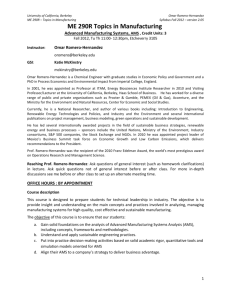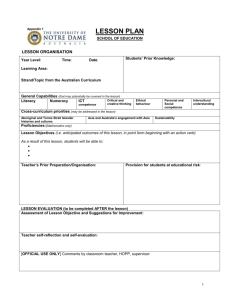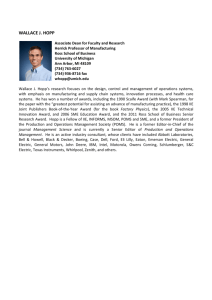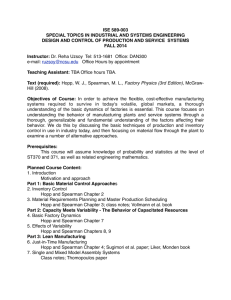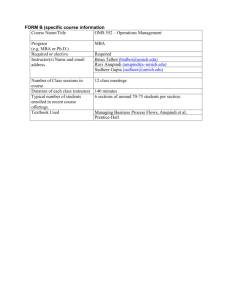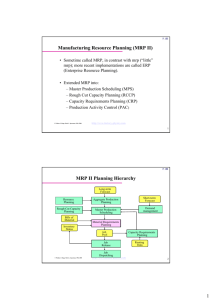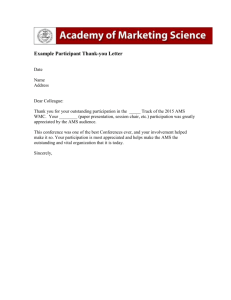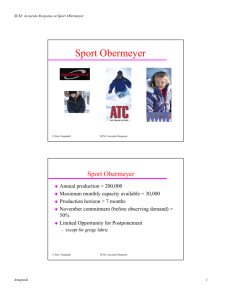Advanced Manufacturing Systems Analysis, AMS
advertisement
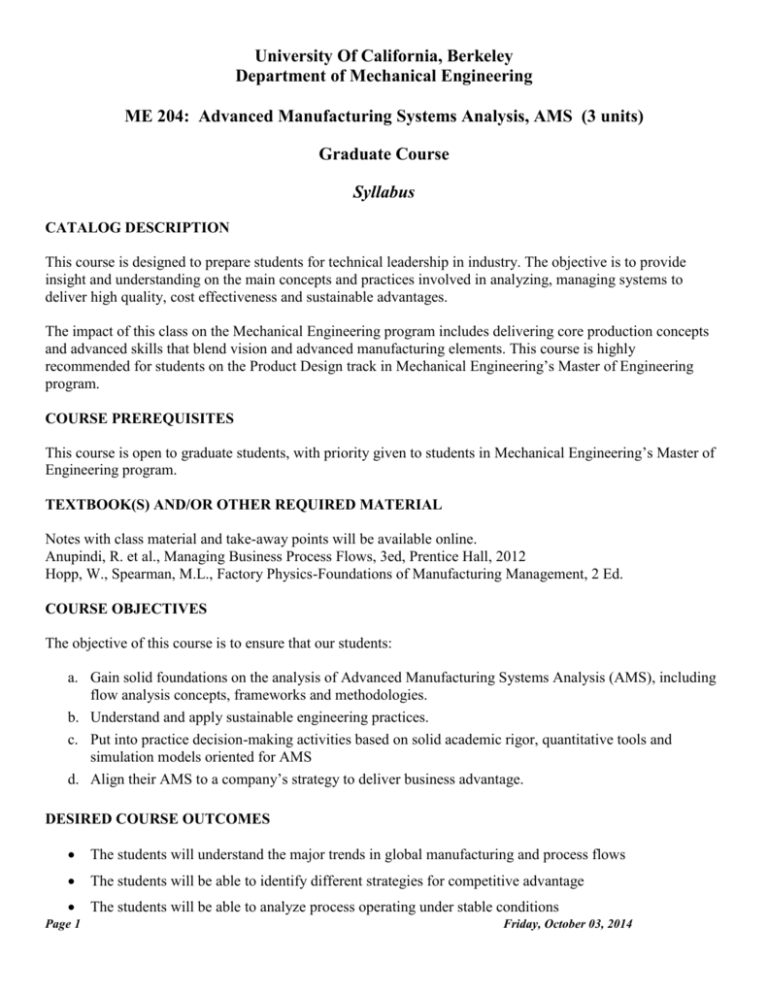
University Of California, Berkeley Department of Mechanical Engineering ME 204: Advanced Manufacturing Systems Analysis, AMS (3 units) Graduate Course Syllabus CATALOG DESCRIPTION This course is designed to prepare students for technical leadership in industry. The objective is to provide insight and understanding on the main concepts and practices involved in analyzing, managing systems to deliver high quality, cost effectiveness and sustainable advantages. The impact of this class on the Mechanical Engineering program includes delivering core production concepts and advanced skills that blend vision and advanced manufacturing elements. This course is highly recommended for students on the Product Design track in Mechanical Engineering’s Master of Engineering program. COURSE PREREQUISITES This course is open to graduate students, with priority given to students in Mechanical Engineering’s Master of Engineering program. TEXTBOOK(S) AND/OR OTHER REQUIRED MATERIAL Notes with class material and take-away points will be available online. Anupindi, R. et al., Managing Business Process Flows, 3ed, Prentice Hall, 2012 Hopp, W., Spearman, M.L., Factory Physics-Foundations of Manufacturing Management, 2 Ed. COURSE OBJECTIVES The objective of this course is to ensure that our students: a. Gain solid foundations on the analysis of Advanced Manufacturing Systems Analysis (AMS), including flow analysis concepts, frameworks and methodologies. b. Understand and apply sustainable engineering practices. c. Put into practice decision-making activities based on solid academic rigor, quantitative tools and simulation models oriented for AMS d. Align their AMS to a company’s strategy to deliver business advantage. DESIRED COURSE OUTCOMES The students will understand the major trends in global manufacturing and process flows The students will be able to identify different strategies for competitive advantage The students will be able to analyze process operating under stable conditions Page 1 Friday, October 03, 2014 The students will be able to analyze process operating under uncertain conditions The students will be able to analyze and integrate cost, quality, delivery time and environmental features into a single manufacturing process. TOPICS COVERED Manufacturing systems Manufacturing and service strategies Analysis of business process flows Flow variability: quality, time, cost Supply Chain Management Design of Sustainable Systems Managing projects CLASS/LABORATORY SCHEDULE 3 hours of lecture per week. Homework assignments. Two group design/analysis projects. One midterm examination. One final examination. The midterm exam is scheduled during lecture. The final exam day-time to be determined. Availability for lectures and all examinations is required for enrollment in the class. Please see me for accommodation of religious beliefs, disabilities, and other special circumstances before the end of the second week of classes for any foreseeable issues. The class format may include lectures, case discussions, mini-cases, guest speakers, computer simulations and software tools. The success of this course relies upon your effort to arrive prepared for class and be actively involved. Students will work individually and in teams to review reallife situations which were faced by managers and are then required to propose assertive solutions. CONTRIBUTION OF THE COURSE TO MEETING THE PROFESSIONAL COMPONENT This course contributes to the development of engineering professionals who aim at blending manufacturing, design and management concepts. Professionals need to articulate a business strategy and align process capabilities towards achieving specific goals. This course teaches how to do this. This is an integrative course which blends concepts from strategy, manufacturing, flow analysis, sustainability and design. Most successful professionals manage to bring together these disciplines. The proposed course Page 2 Friday, October 03, 2014 represents a school effort to let students blend these concepts within an academic environment. Eventually, these students will be able to repeat these experiences in their work. ASSESSMENT OF STUDENT PROGRESS TOWARD COURSE OBJECTIVES Grading: Homework 15% Class Participation 10% Projects 30% Midterm Exam 15% Final Exam 30% Homework: Homework will be assigned in lecture and will be due as indicated on each homework (usually one week later). Please do plan in advance since no questions concerning the homework problems, projects, exams, presentations etc. will be accepted 24 hrs prior to the corresponding deadline. Late homework will not be accepted. You must turn in all problems together (i.e. you can’t turn in some on time and others late). Make sure that procedure and reasoning behind your answer is included. Case studies: Case studies will be discussed in this class. Instructions for preparing for discussion of the cases will be reviewed during class. Business cases posted on study.net are copyrighted material and must be purchased. Online you will find questions for the cases. These are graded assignments, due by 09:00 on the day of the class meeting. Groups, Simulations, and Class Projects: We will be working in groups for much of the semester. The groups will work primarily on two term projects with a manufacturing company. The objective is to learn about real manufacturing system problems from an engineering-management perspective, gain experience working in teams, and develop your communication and presentation skills to complement your analytic skills. Projects are about process analysis, design, and simulation. Details of both projects will be covered in class. The projects will require periodic progress reports. The first project will be submitted one class before the midterm exam. A presentation of your design/analysis as well as one formal report and presentation per group is also required. The second project will be submitted not later than the last lecture in November. Projects are intended as opportunities for each student to contribute her/his special skills. Pleases note that it is expected that all students will participate in the group project with equal effort. Peer evaluations will be part of the final project grade. Page 3 Friday, October 03, 2014 TOPICS COVERED/WEEKLY AGENDA Topics to be covered in the course: Readings Main Objective to cover 1 1. Introduction and course presentation 2 2. The Industrial Enterprise. Manufacturing Management & Strategy Production systems, dynamics Hopp, Ch1 Anupindi Ch1, 2 a, b, d 3 Hopp, Ch1 Anupindi Ch3 a, b, d 6 3. Process Flow Metrics Introduction, Flow measures, Little’s law, Top-down analysis. 4. Flow Time Analysis Time based competition, theoretical flow times Critical paths, resource allocation, implications for cost. 5. Flow Rate Capacity Analysis Theoretical and net capacity analysis, the role of resources, inventory (cash, items, orders, etc) 6. Inventory Analysis 7 7. Managing Flow Variability: Safety Inventory 8 Midterm Exam Tuesday 10/09 8. Managing Flow Variability: Safety Inventory & Capacity 4 5 9 10 11 12 9. Managing Flow Variability: Process Control and Capability Quality Manufacturing, sustainability and quality Process Capability Product Design (Guest Lecturer) 10. Lean Manufacturing: Synchronization 11. Supply Chain Management Green supply chains 12. Sustainable system design and manufacturing Ways to evaluate env. impact of products 13 13. Project management Project change management 14 14. Pulling all together Final presentations Final Exam http://registrar.berkeley.edu/Default.aspx?PageID=examf.html 15 Page 4 Hopp, Ch1 a, c, d Anupindi Ch4 Anupindi Ch5 Hopp 18 a, c, d Anupindi Ch6 Hopp, Ch 2.1, 2.2 Anupindi Ch7 Hopp 13 Hopp 17 a, c, d Anupindi Ch8 a, c, d Anupindi Ch9 Hopp 12 a, c Anupindi Ch9 Hopp 12 Anupindi Ch10 bSpace a, c, d a, c a, b, d Cases a, b, d Hopp 19 Meredith a, b, c, d Friday, October 03, 2014 PERSON(S) WHO PREPARED THIS DESCRIPTION Omar Romero-Hernandez, 10/1/14 ABBREVIATED TRANSCRIPT TITLE (19 SPACES MAXIMUM): AMS ANALYSIS TIE CODE: LECT GRADING: Letter and/or P/NP SEMESTER OFFERED: Spring and Fall COURSES THAT WILL RESTRICT CREDIT: None INSTRUCTORS: Faculty DURATION OF COURSE: One academic semester EST. TOTAL NUMBER OF REQUIRED HRS OF STUDENT WORK PER WEEK: 9 IS COURSE REPEATABLE FOR CREDIT? No CROSSLIST: None Page 5 Friday, October 03, 2014
